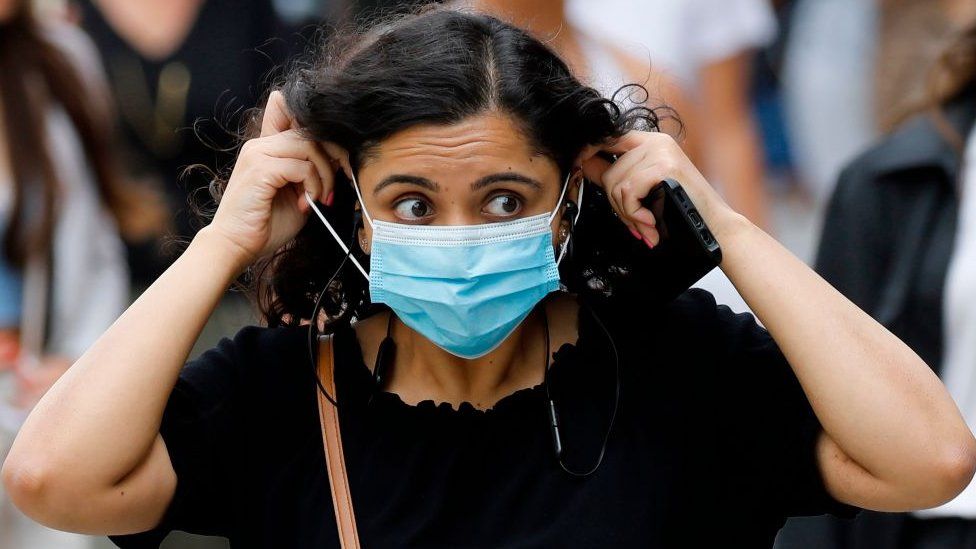Fears over the new Covid variant Omicron mean many people are questioning whether Christmas parties should go ahead this year.
Some companies have cancelled or scaled back their plans, and some schools have decided not to go ahead with end-of-term events like nativity plays.
What’s been said about Christmas parties?
Earlier this week, Dr Jenny Harries, head of the UK Health Security Agency, said we shouldn’t be socialising “when we don’t particularly need to”.
But Boris Johnson said the government wasn’t changing its guidance “about how people should be living their lives”, and urged people not to cancel Christmas events.
Scotland’s First Minister Nicola Sturgeon said everyone should carry out a lateral flow test before meeting others over the festive period.
Wales First Minister Mark Drakeford has warned people to “think carefully” about whether to meet vulnerable relatives over Christmas.
Meanwhile, Health Secretary Sajid Javid suggested people could consider testing before meeting, and wearing face masks while socialising.
What are the rules on social contact in England?
Almost all formal social distancing rules – such as limits on gatherings – ended in the summer.
Large groups can still hold parties in houses, bars, nightclubs or karaoke venues. Schools are allowed to hold events for parents if they wish.
The government’s Winter Plan for England says “meeting outdoors is safer”. Drinking with colleagues outside a pub is much less risky than socialising together inside, at the bar. If you are indoors, you should allow in plenty of fresh air.
The government says people should still “consider the risks of close contact”, particularly if someone is clinically extremely vulnerable, or not fully vaccinated.
It’s a legal requirement to wear a face covering in shops and on public transport, unless you are exempt.
Government guidance also says: “You should still continue to wear a face covering in crowded and enclosed spaces where you may come into contact with other people you do not normally meet.”
 IMAGE SOURCE,GETTY IMAGES
IMAGE SOURCE,GETTY IMAGESWhat are the rules in Scotland?
Most rules on social distancing and limits to the size of gatherings were lifted in August.
However, the 2m (6ft) social distancing rule is still required in healthcare settings including doctors’ surgeries and hospitals.
The law no longer requires people to keep a certain distance from each other in most public places. But the advice remains to keep a safe distance from those in other households – especially indoors – and to avoid crowded places.
Face coverings are still compulsory in most public indoor settings, such as shops and on public transport – as well as in pubs and restaurants when not seated.
All over-18s are required to prove their vaccine status at nightclubs and other venues.
 IMAGE SOURCE,GETTY IMAGES
IMAGE SOURCE,GETTY IMAGESWhat is the situation in Wales?
Formal social distancing rules came to an end in Wales on 7 August.
There is no limit to the number of people who can meet indoors or outdoors. But businesses have to carry out their own risk assessments for venues and premises.
Face coverings remain compulsory in most indoor public places, and on public transport – but not in pubs and restaurants.
The NHS Covid Pass is needed for entry to nightclubs, cinemas, theatres and concert halls and many other indoor and outdoor events.
 IMAGE SOURCE,GETTY IMAGES
IMAGE SOURCE,GETTY IMAGESWhat restrictions are still in place in Northern Ireland?
There’s no requirement to socially distance outside.
A maximum of 30 people from an unlimited number of households can meet indoors in domestic settings. Social distancing should be maintained as much as possible.
Shops must take “reasonable measures to manage risk” and shoppers are asked to maintain physical distance with each other where possible.
Face coverings are compulsory in shops, indoor seated venues and visitor attractions, public transport and some other settings – unless you are exempt.
Vaccine passports are required for venues including nightclubs, bars and cinemas.
Why is social distancing important?
Coronavirus spreads mainly when an infected person coughs, sneezes or speaks – sending small droplets, packed with the virus, into the air.
The further apart people are, the lower the risk of the infection spreading.



No comments:
Post a Comment
Note: only a member of this blog may post a comment.